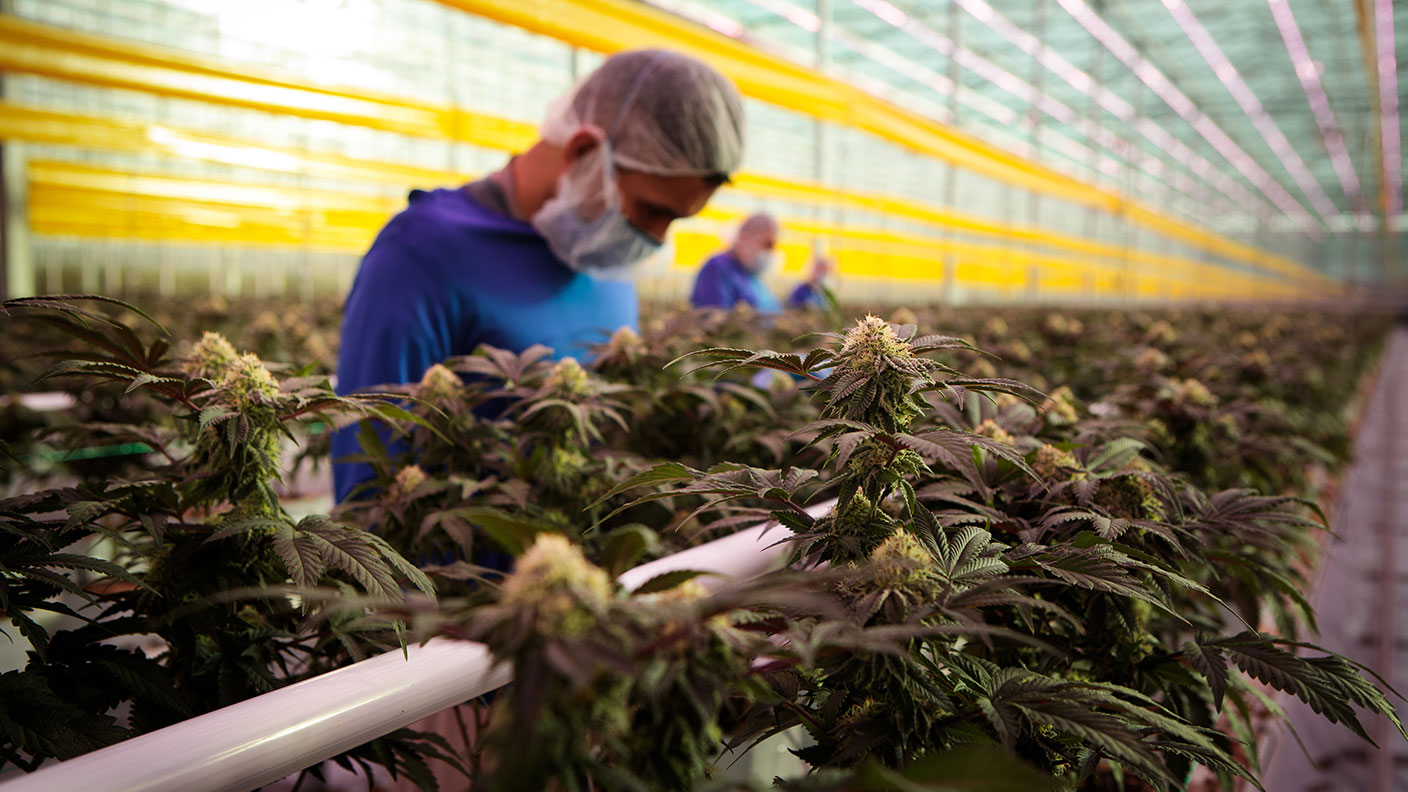Investors are experiencing a cannabis comedown
Things seemed to be turning out well for pot-heads in 2019 – and for the companies that seek to provide for their needs. Then a new, more depressing reality dawned.
Get the latest financial news, insights and expert analysis from our award-winning MoneyWeek team, to help you understand what really matters when it comes to your finances.
You are now subscribed
Your newsletter sign-up was successful
Want to add more newsletters?

Twice daily
MoneyWeek
Get the latest financial news, insights and expert analysis from our award-winning MoneyWeek team, to help you understand what really matters when it comes to your finances.

Four times a week
Look After My Bills
Sign up to our free money-saving newsletter, filled with the latest news and expert advice to help you find the best tips and deals for managing your bills. Start saving today!

Things seemed to be turning out well for pot-heads in 2019 and for the companies that seek to provide for their needs. Then a new, more depressing reality dawned.
What's happened?
This was the year in which Canadian and US cannabis stocks burned brightly but then went up in smoke. At the start of the year, cannabis stocks (such as Canopy Growth, Aurora Cannabis and Innovative Industrial Properties) were all the rage on the back of legalisation in Canada and California and a tripling in size of the worldwide legal cannabis market over the past four years.
In the US, 33 states now allow medical use of cannabis, and 11 have legalised recreational use. Medical use is increasing across Latin America and in countries including Germany, South Korea and Thailand.Breathless predictions suggested that the legal global market could be worth $150bn within ten years that's about the size of the global illicit market now. Since the spring, however, the market has turned, with most pot stocks losing at least half their value, and plenty of them far more than that.
MoneyWeek
Subscribe to MoneyWeek today and get your first six magazine issues absolutely FREE

Sign up to Money Morning
Don't miss the latest investment and personal finances news, market analysis, plus money-saving tips with our free twice-daily newsletter
Don't miss the latest investment and personal finances news, market analysis, plus money-saving tips with our free twice-daily newsletter
What has caused the downturn?
In part, it's the old story of greed followed by fear. This is a relatively thinly traded market (and one unusually skewed towards retail investors) which has seen irrational exuberance followed by a sell-off. But there's lots of fundamental factors, too. Canadian regulators have been swamped by licensing applications, and retail rollouts have been slower than predicted. The health scare over vaping has dampened enthusiasm. Sales and earnings figures have disappointed.
And the whole market has been spooked by unnerving data from California. The traditionally liberal state is the world's biggest legal cannabis market, where medicinal use has been legal since 1996. Ominously, though, since the legalisation of recreational cannabis at the start of 2018, the legal cannabis market has actually shrunk.
According to stats from market analysts Arcview Market Research and BDS Analytics, the size of the legal cannabis market there fell from $3bn in 2017 to $2.5bn last year. The main reason for this is that many firms in the medical space have found the new array of regulations too onerous, and the fees for permits and licences so pricey that they've struggled to make their businesses work.
What about the recreational market?
Even in California, the retail cannabis market has not taken off as expected. Many cities still don't allow shops, despite state-level legalisation. Some cities, including LA, allow shops, but have been super-slow to issue licences. And the high taxes payable on the cultivation and retail of cannabis (which remains illegal under US federal law) have made the end-product expensive.
In August, an Economist journalist researching the marijuana market at Harborside Oakland ("a modern-day temple to the delights and possibilities of the botanical marvel that is the plant Cannabis sativa") was advised she could get an ounce of cannabis delivered (illegally) outside the store for $150. Inside, the same product was priced at $400.
Is cannabis safe?
The arguments in favour of decriminalisation are familiar and clear: less power to criminal gangs, fewer young people criminalised, lots of tax revenues for the state coffers. But sceptics say that all these arguments rely on the assumption that cannabis is basically benign, when in fact it's more dangerous than it was a couple of decades ago. "Study after study", says Clare Foges in The Times, "has found a clear association between the high levels of THC that most present-day cannabis contains and serious mental health problems, particularly schizophrenia and psychosis". In London, a study found that the use of super-strength cannabis had helped push up psychosis rates to the highest in Europe. "If we could abolish the consumption of skunk, we would have 30% fewer patients," says Professor Sir Robin Murray, a psychiatrist at King's College London.
Won't regulation address that?
The idea that regulation will ensure that only safer, low-THC forms of cannabis are licensed is nonsense, argues Foges. That's because people who want the bigger hit will still buy through the traditional illicit channels as has proved to be the case in Canada. "Around the world we have seen that legalisation does not rid a country of its dealers; instead, by normalising drug use, it increases their potential market."
How policy-makers around the world balance these issues will be "the single biggest catalyst" when it comes to the future prospects of the sector, says Christopher Carey, an analyst with Bank of America. His bank's research puts the value of global cannabis sales at $166bn this year but the legal slice of that (mostly in North America) is just $15bn. Until that balance changes dramatically, investing in cannabis stocks is always going to be very high risk.
Is it still worth taking a punt?
As ever, that depends on individual investment objectives and appetites for risk. In the short-term, some analysts think that the sector is likely to see further losses. But in the longer term the outlook remains positive.
One key factor to bear in mind is the distinction between recreational and medicinal uses. Europe is much more focused than North America on the latter sector. Companies such as GW Pharmaceutical, for example, have a number of promising patents for medical applications (Cannabidiol, or CBD, is the basis for its epilepsy drug Epidiolox, for example). This is the sector that currently has the most promise.
But potential investors should be aware that the market is immature the results of clinical testing (in the medicinal space) or the emergence of trusted consumer brands (in the recreational arena) remain to be seen. This situation will change in time, however. That could be the tipping-point.
Get the latest financial news, insights and expert analysis from our award-winning MoneyWeek team, to help you understand what really matters when it comes to your finances.
-
 Early signs of the AI apocalypse?
Early signs of the AI apocalypse?Uncertainty is rife as investors question what the impact of AI will be.
-
 Reach for the stars to boost Britain's space industry
Reach for the stars to boost Britain's space industryopinion We can’t afford to neglect Britain's space industry. Unfortunately, the government is taking completely the wrong approach, says Matthew Lynn
-
 How you can profit from the fast-growing cannabis industry
How you can profit from the fast-growing cannabis industryTips Once an investment taboo, the cannabis sector is poised to thrive in 2021. David Stevenson looks at how best to buy in.
-
Profit from the long-term potential in cannabis
Tips Nawan Butt, portfolio manager of the Medical Cannabis and Wellness UCITS ETF, picks some of his favourite cannabis stocks.
-
There is still plenty of potential for investors in cannabis
Tips The cannabis sector is out of favour, but a new ETF is an appealing recovery play
-
 Cash in on cannabis as a new industry emerges
Cash in on cannabis as a new industry emergesCover Story The prohibitionist era is over: countries are rapidly legalising marijuana for medical and recreational use. Ben Judge reviews the latest developments and explains how to profit from pot.
-
Cannabis sector gets high on mergers
Features The cannabis sector’s urge to merge shows no sign of abating, with Canada’s Canopy Growth Corp agreeing to buy Acreage Holdings, one of the biggest US marijuana growers, in a $3.4bn deal.
-
How to profit as marijuana becomes mainstream
Cover Story Next year recreational cannabis use becomes legal in California. With Canada also set to lift its ban, Big Weed will soon present a host of investment opportunities, says Ben Judge.